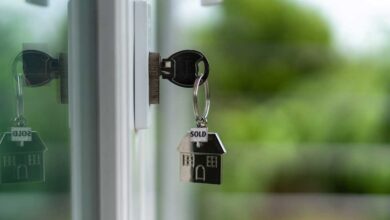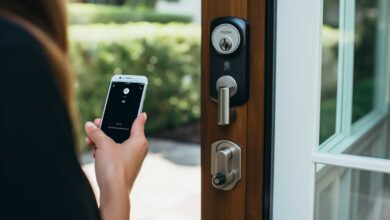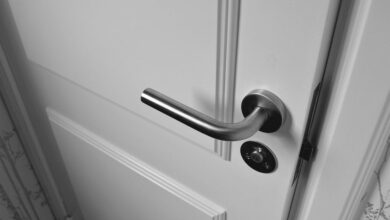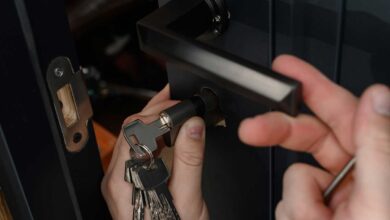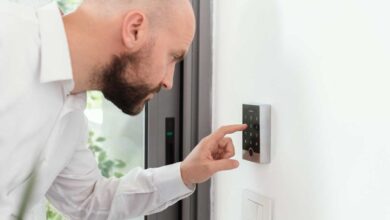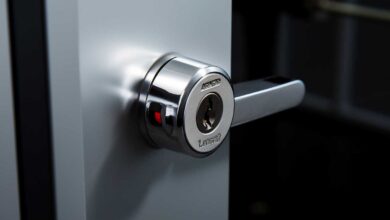Preventive Maintenance For Residential Locks
KEY TAKEAWAYS
Home security is paramount, and the first line of defense is often the locks on our doors. Ensuring they function optimally is not just a matter of convenience but of safety. Preventive maintenance for residential locks is a crucial step in ensuring that your home remains a fortress against unwanted intrusions.
This guide delves deep into the intricacies of maintaining your locks, ensuring longevity, and guaranteeing security. From understanding internal components to preventing frozen locks, ensure your home’s security is always at its peak.
The Importance Of Residential Lock Maintenance
Residential locks, whether they are traditional or digital, play a pivotal role in safeguarding our homes. Over time, wear and tear, environmental factors, and daily use can degrade their performance. Regular maintenance not only prolongs the life of the lock but also ensures it functions at its peak.
Steps For Preventive Maintenance For Residential Locks
Like other mechanical devices, locks can wear out over time and may fail to function correctly if not properly maintained. This is where the importance of lock maintenance comes into play. These simple yet effective steps on how to maintain your locks, prolong their lifespan, and ensure they continue providing the security you need.
Regular Cleaning
The longevity and functionality of your residential locks can be significantly enhanced through regular cleaning. Here’s a detailed breakdown:
Dirt Accumulation: Over time, external factors such as dust, moisture, and pollutants can lead to the accumulation of dirt and grime in the lock mechanism.
External Cleaning:
-
Use a soft cloth dampened with a mild cleaner to wipe the exterior of the lock.
-
Ensure the cloth isn’t overly wet to prevent moisture from seeping into the lock mechanism.
Internal Cleaning:
-
For the internal components, use a can of compressed air to blow out any accumulated dust or debris.
-
Ensure the nozzle is held at a safe distance to avoid damage to the internal parts.
Lubrication
Lubrication is essential for the smooth operation of your locks. Here’s what you need to know:
Why Lubricate?
Friction between moving parts can lead to wear and tear. Lubrication reduces this friction, ensuring smooth operation and prolonging the life of the lock.
Choosing The Right Lubricant:
-
Opt for a graphite-based lubricant. It’s specifically designed for locks and won’t gum up over time.
-
Avoid oil-based lubricants. They can attract and trap dirt, leading to blockages and malfunctions.
Application:
-
Apply the lubricant sparingly. A little goes a long way.
-
Ensure you cover all moving parts, especially the keyhole and bolt mechanism.
Dry Lubricants: Types Of Dry Lubricants For Residential Locks
Dry lubricants are essential for maintaining the smooth operation of locks:
-
Graphite Powder: A commonly used lubricant for locks due to its non-sticky nature and excellent lubricating properties.
-
PTFE (Teflon) Sprays: These provide a thin, smooth layer that reduces friction in the lock mechanism.
Excess Use Of Dry Lubricants And Its Dangers
While lubrication is crucial, over-lubrication can pose problems:
-
Dirt Accumulation: Excess lubricant can attract and trap dirt, leading to blockages.
-
Reduced Effectiveness: Too much lubricant can cause components to slip, reducing the lock’s effectiveness.
Check For Wear And Tear
Regular inspections can prevent potential lock failures. Here’s how to go about it:
Signs Of Wear:
Look out for visible signs of wear on the lock, such as rust, corrosion, or visible damage.
Functional Checks:
-
Test the key’s turning mechanism. If it’s not smooth or if it sticks, it’s a sign of wear.
-
Check the stability of the lock. If it feels loose or wobbly, it might need tightening or replacement.
Frequency:
It’s advisable to perform these checks every few months, especially for exterior locks exposed to the elements.
Update Old Locks
Lock technology has evolved rapidly, offering enhanced security features. Here’s why and how you should consider updating:
Technological Advancements: Newer lock models come with advanced features like biometric access, smart connectivity, and anti-tampering mechanisms.
Assessing Your Current Lock:
-
Determine the age of your lock. If it’s several years old, it might not offer the best security features available today.
-
Check for signs of physical wear or outdated mechanisms.
Upgrading:
-
Consult with a professional locksmith or security expert to understand the best options available.
-
Consider locks that offer a balance between advanced security features and user-friendliness.
Strike Plates And Their Role In Lock Maintenance
Strike plates are the metal plates attached to the door frame where the bolt engages. Their proper alignment and condition are crucial for the lock’s functionality:
-
Wear And Tear: Over time, strike plates can become worn or damaged, affecting the lock’s alignment.
-
Adjustment: Periodically checking and adjusting the strike plate ensures the bolt engages smoothly and securely.
Aligning Misaligned Locks For Improved Security
Misaligned locks can compromise security:
-
Regular Checks: Periodically ensure the bolt aligns correctly with the hole in the strike plate.
-
Adjustment Techniques: This can involve repositioning the strike plate, adjusting the door hinges, or even reshaping the bolt hole for a perfect fit.
Frozen Exterior Door Locks And How To Fix Them
Cold weather can cause exterior door locks to freeze:
-
Prevention: Applying a de-icer or silicone spray before the onset of winter can prevent freezing.
-
Thawing: If a lock does freeze, heating the key or using a commercial lock de-icer can help.
By diligently following these steps, homeowners can ensure the longevity and optimal functionality of their residential locks, providing peace of mind and enhanced security.
The Role Of Professional Locksmiths
While many homeowners are adept at basic lock maintenance, the intricate nature of modern locking systems often necessitates the expertise of a professional locksmith. These experts bring a wealth of knowledge, experience, and specialized tools to the table, ensuring your locks are in the best possible condition.
Scheduled Inspections
Regular inspections by a professional locksmith are instrumental in maintaining the health and longevity of your locks. Here’s a detailed breakdown:
Importance Of Regular Checks: Over time, even the most robust locks can develop issues, many of which might be invisible to the untrained eye. Regular inspections can preemptively identify and rectify these problems.
Annual Assessments:
-
It’s advisable to have a locksmith inspect your locks at least once a year.
-
This ensures that wear and tear, internal damage, or outdated mechanisms are identified early on.
Tailored Solutions:
-
Locksmiths can provide insights specific to the type and brand of your locks.
-
Based on the assessment, they can offer solutions tailored to your needs, whether it’s a minor tweak, a major repair, or a complete replacement.
Advanced Maintenance Techniques
The world of locks is vast and varied, with each type presenting its own set of challenges. Locksmiths are trained to handle these complexities. Here’s what their advanced maintenance entails:
Specialized Tools:
-
Locksmiths come equipped with a range of tools designed specifically for lock maintenance and repair.
-
These tools allow them to address issues that might be impossible to tackle with standard household tools.
Complex Lock Issues:
-
Whether it’s a digital lock that needs recalibration or a traditional deadbolt that’s misaligned, locksmiths have the expertise to handle it.
-
They can also address more intricate problems like internal mechanism failures or electronic malfunctions in smart locks.
Continuous Learning:
-
The locksmithing industry is ever-evolving, with new lock technologies emerging regularly.
-
Professional locksmiths stay updated with these advancements, ensuring they can handle even the latest lock models with ease.
Benefits Of Regular Lock Maintenance
Locks, whether they safeguard our homes, vehicles, or personal belongings, play an indispensable role in our lives. Their importance often goes unnoticed until they malfunction or fail. Regular lock maintenance, though sometimes overlooked, offers a plethora of benefits that ensure our security and peace of mind.
Enhanced Security
-
Optimal Functionality: Regularly maintained locks function as intended, providing the maximum level of security. Over time, internal components of a lock can wear down, reducing its effectiveness. Maintenance ensures these components are in top shape.
-
Early Detection: Regular checks can identify vulnerabilities or potential points of failure in a lock, allowing for timely replacements or repairs.
Prolonged Lifespan Of Locks
-
Durability: Just like any other mechanical device, locks benefit from regular upkeep. Maintenance can significantly extend the life of your locks, ensuring they serve you for years to come.
-
Cost-Efficiency: While there might be a small outlay for regular maintenance, this cost is often dwarfed by the potential expense of replacing locks that have been prematurely worn out or damaged.
Smooth Operation
-
Ease Of Use: A well-maintained lock operates smoothly. Keys turn effortlessly, and mechanisms engage as they should, making the process of locking and unlocking seamless.
-
Reduced Risk Of Lockouts: One of the common issues with deteriorating locks is the risk of keys getting stuck or the lock jamming. Regular maintenance reduces such occurrences, preventing inconvenient and potentially costly lockouts.
Preservation Of Door Integrity
-
Avoiding Damage: A malfunctioning lock can damage the door it’s fitted in. For instance, a misaligned bolt can scrape or gouge the door frame over time. Regular maintenance ensures the lock and its components are aligned and functioning correctly, preserving the integrity of the door.
Cost Savings
-
Prevention Over Replacement: It’s often cheaper to maintain and repair a lock than to replace it entirely. Regular maintenance identifies and rectifies minor issues before they escalate into major problems that demand a complete lock replacement.
-
Energy Efficiency: This might seem unrelated, but for electronic or smart locks, ensuring they’re functioning correctly can lead to energy savings. Malfunctioning electronic locks can drain batteries or consume excess power, leading to increased costs.
Peace Of Mind
-
Consistent Reliability: There’s a certain peace of mind that comes from knowing your locks are in optimal condition, ready to protect your home, vehicle, or valuables.
-
Professional Expertise: Regular maintenance, especially when done by professionals, ensures that your locks are not just superficially functional but are genuinely secure based on expert assessments.
Signs Of Wear In Internal Components
Over time, these components can show signs of wear, including:
-
Stiffness: Difficulty in turning the key or engaging the bolt.
-
Misalignment: The bolt doesn’t align correctly with the strike plate on the door frame.
-
Loose Components: The lock feels wobbly or unstable.
Frequently Asked Questions
We have addressed some of the most commonly asked queries to provide you with a better understanding of preventive maintenance for residential locks.
How often should I maintain my residential locks?
Regular maintenance is pivotal for lock longevity and functionality. While homeowners can perform basic checks monthly, a comprehensive professional inspection is recommended annually. This ensures that wear and tear, internal damage, or outdated mechanisms are identified and addressed promptly.
Can I use any lubricant for my locks?
Not all lubricants are suitable for locks. It’s essential to use dry lubricants like graphite powder or PTFE sprays, which are specifically designed for lock mechanisms. Oil-based lubricants, while seemingly effective, can attract dirt, leading to blockages and potential malfunctions over time.
What should I do if my key is hard to turn in the lock?
A key that’s hard to turn can indicate several issues, from a misaligned bolt to internal wear. Start by lubricating the lock with a recommended dry lubricant. If the issue persists, it might be a sign of more significant wear or damage, and consulting a professional locksmith would be the next best step.
How can I prevent my exterior door locks from freezing in winter?
To prevent exterior door locks from freezing, proactive measures are crucial. Before the cold season begins, apply a de-icer or silicone spray to the lock. Additionally, shielding the lock from direct exposure to moisture, such as rain or snow, can significantly reduce the risk of freezing.
Are digital or smart locks maintenance-free?
While digital or smart locks might seem more advanced, they aren’t entirely maintenance-free. They require periodic checks to ensure battery levels are optimal, electronic components are functioning without glitches, and software or firmware is updated to the latest versions to prevent potential security vulnerabilities.
How do I know if my lock needs replacement instead of maintenance?
Locks, like all mechanical devices, have a lifespan. If, after thorough maintenance, the lock continues to malfunction, feels unstable, or shows evident signs of wear, it’s likely time for a replacement. A professional locksmith can assess the lock’s condition and recommend whether maintenance or replacement is the more appropriate course of action.
The Bottom Line
In the realm of home security, the importance of preventive maintenance for residential locks cannot be overstated. From ensuring optimal security to saving costs in the long run, the benefits are undeniable. Investing time and resources in routine lock maintenance is a small price to pay for the immense value it offers in return. By following the steps outlined above and leveraging the expertise of professional locksmiths, homeowners can ensure that their locks remain in top condition, providing peace of mind and unmatched security.
Discover more about how to keep your house and family safe by reading our in-depth guide on the cost of maintenance and repairs for home security systems. For additional information, visit Security Forward and explore our resources and guides.
